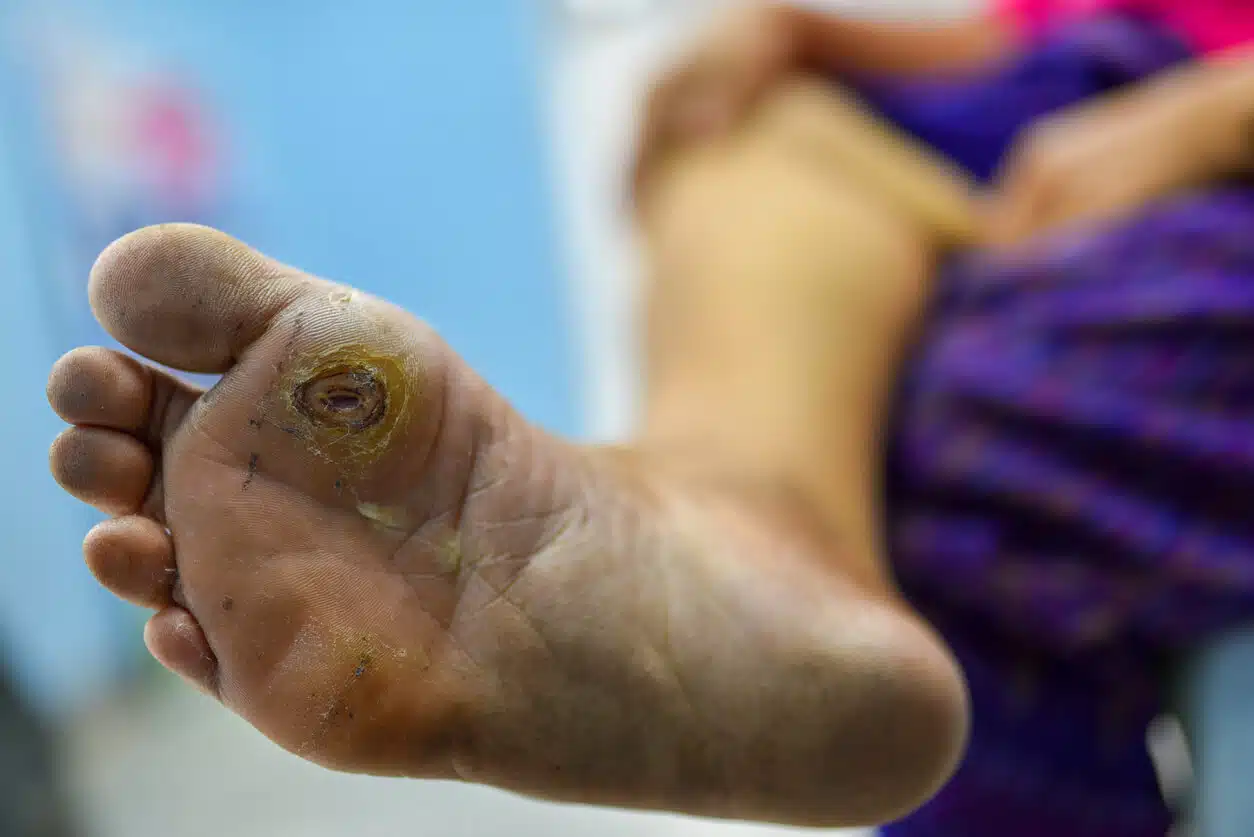
Diabetic foot ulcers are a very serious risk that individuals with diabetes have to consider. About 5 percent of diabetes develop diabetic foot ulcers, and one percent end up with an amputation.
Foot ulcers are wounds that develop on the bottom of the foot. It can be a small cut, scrape, corn, or callus that can lead to the development of a diabetic ulcer. It can be very difficult to treat and requires medical intervention. Doctors who specialize in diabetic foot care can help you prevent diabetic foot ulcers and complications that can arise from them.
The good news is that there are plenty of strategies that people with diabetes can implement to prevent diabetic foot ulcers from developing in the first place. Here, we talk about diabetic foot ulcers and give you useful strategies for maintaining skin integrity with diabetes.
What Are Diabetic Ulcers and What Causes Them to Develop?
Diabetic foot ulcers often occur in people with diabetes because damage to the nerves and blood vessels in the feet can lead to decreased sensation and slower wound healing. As a result, minor cuts or blisters can go unnoticed or untreated, which can eventually develop into a foot ulcer.
What Complications Can Foot Ulcers Lead To?
Without proper treatment, foot ulcers can lead to serious complications. Infections can develop, which can spread to the bone (osteomyelitis). The further it spreads, the greater the chance of amputation.
Foot ulcers can make it difficult to walk, as you need to keep pressure off the wound. You may need to wear special diabetic shoes as you heal from a sore. Combined with all other serious, lifelong complications that can occur, it is essential to take steps to prevent ulcers from developing in the first place.
How Do You Maintain Skin Integrity?
One of the most important things you can do to prevent diabetic foot ulcers is to maintain skin integrity. This means taking care of your feet to reduce the risk of injury and infection.
Here are some strategies for promoting skin integrity when you have diabetes:
- Wash your feet daily with lukewarm water and mild soap, and dry them carefully, including between the toes.
- Moisturize your feet daily to prevent dry skin, but avoid applying lotion between the toes, which can create a moist environment that encourages bacterial growth.
- Check your feet daily for changes to the skin, whether it’s a cut, scratch, or an abnormal growth. If you have decreased sensation in your feet, use a mirror or ask someone else to help you check for injuries.
- Avoid walking barefoot, even when inside your home. Keep feet cushioned, supported, and protected when you are on them.
- If your feet feel cold at night, wear socks to bed. Change your socks daily and never recycle them.
- Wear shoes that fit well and are comfortable, and avoid shoes that rub against the skin or cause blisters.
- Trim your toenails straight across and file any sharp edges to avoid ingrown nails, which can develop into something serious with diabetes.
- If you have a corn or callus, do not treat it yourself. Don’t use over-the-counter foot care products like corn or callus removers, as these can cause skin damage and increase the risk of infection. Let your diabetic foot doctor examine and treat it.
There are additional steps you can take to prevent the development of diabetic foot ulcers. These include controlling your blood sugar levels, exercising regularly to promote circulation, and quitting smoking if you are a smoker. If you have neuropathy, it may be helpful to perform daily foot exercises to increase blood flow and maintain flexibility.
When to Seek Medical Attention
If you notice any signs of a foot ulcer, such as redness, swelling, or drainage from a wound, it is essential to seek medical attention right away. A foot and ankle surgeon can recommend the best course of treatment, which may include antibiotics, dressings, and offloading devices to reduce pressure on the ulcer.
Diabetic Foot Ulcer Treatment in North Dakota
For high-quality diabetic foot care, choose The Bone & Joint Center. We are staffed with highly skilled orthopedic surgeons with advanced training in foot and ankle care. We provide proper guidance on diabetic foot care and maintaining skin integrity. We also routinely treat patients with complications from foot ulcers.
To schedule an appointment for diabetic foot management, call (701) 946-7400 / (866) 900-8650 or use our online request form.

